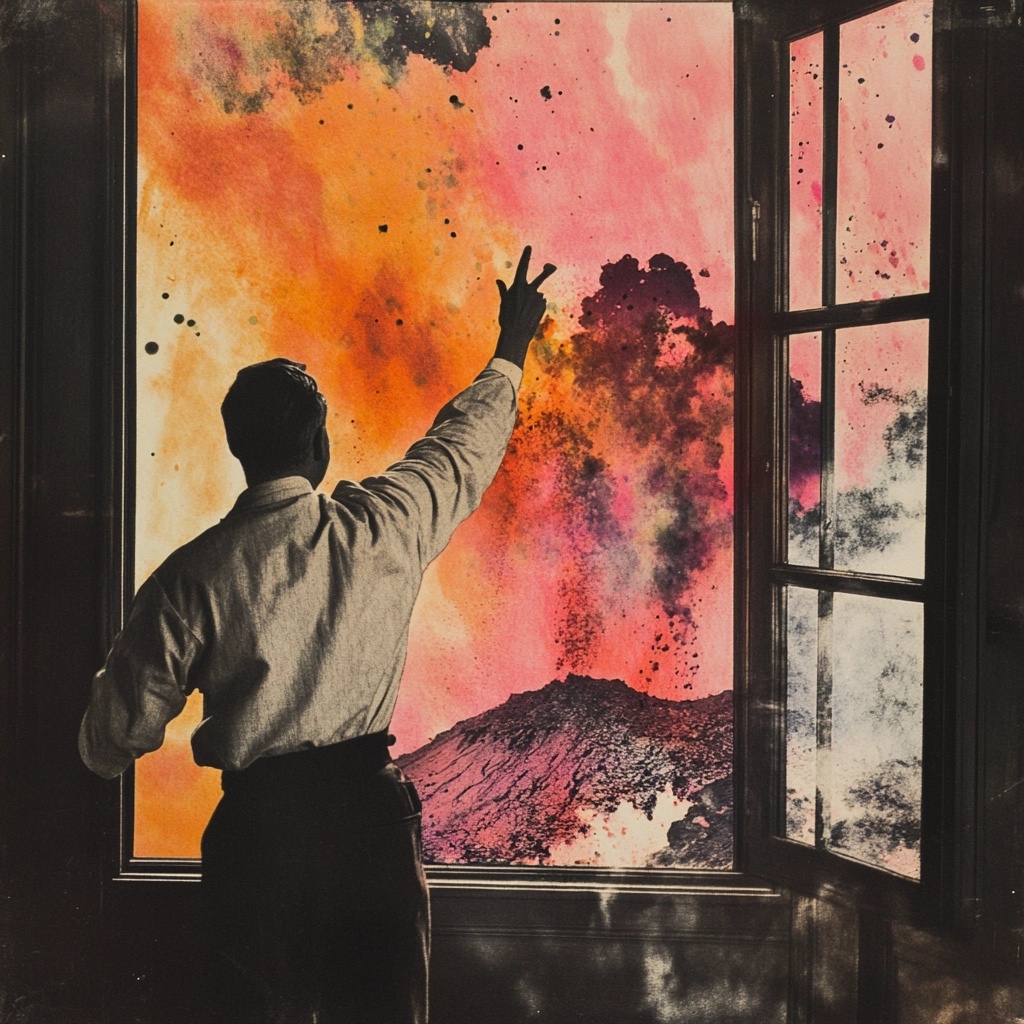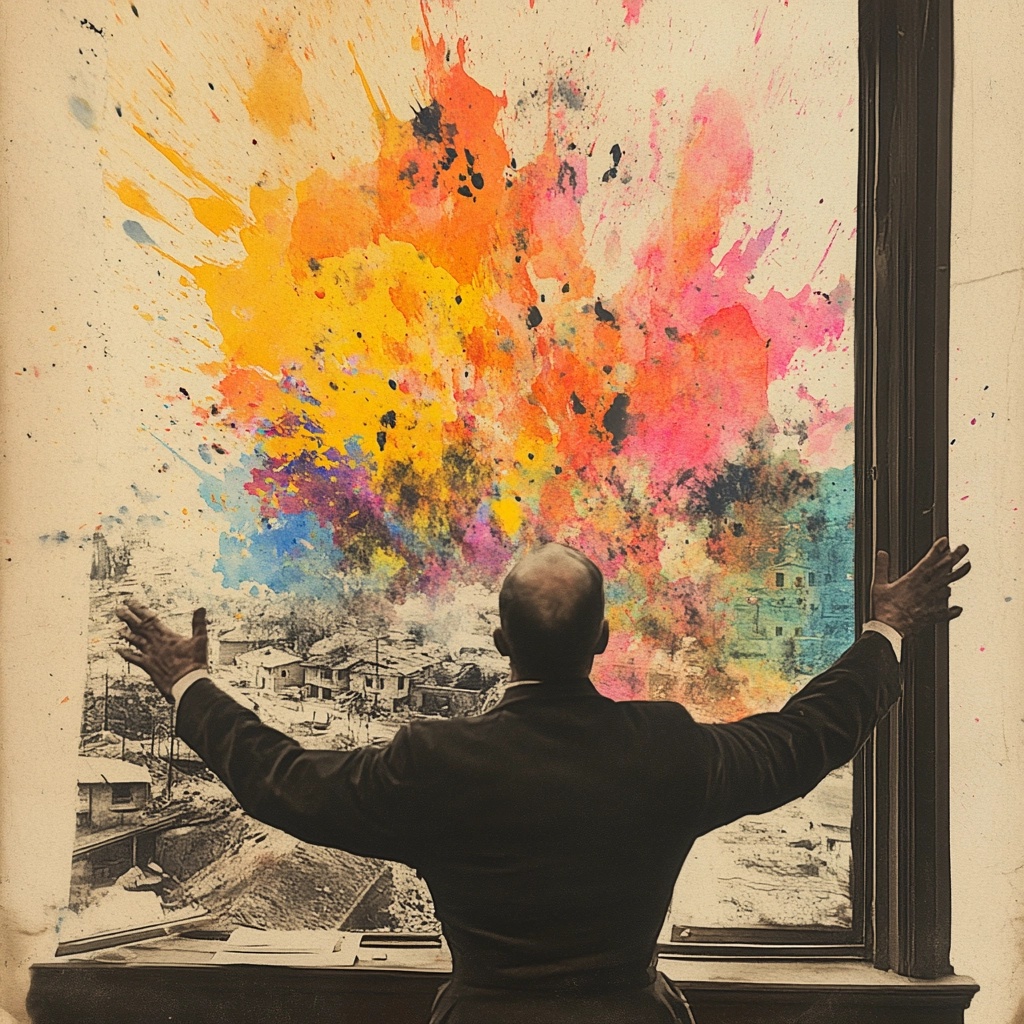THE NEW ADAM (1)
By:
July 19, 2025
The New Adam is a 1926 proto-sf novel by the Swiss author Hélène Dufour Pittard (writing as “Noëlle Roger”). The book concerns, one reads in the Science Fiction Encyclopedia, “a wholly logical and unpleasant Superman created by gland transplants.” HILOBROW is pleased to serialize Book IV from The New Adam in Josh Glenn’s translation, from the original serialized in the 23 February 1924 issue of the journal La Petite Illustration.
THE NEW ADAM: 1 | 2 | 3 | 4 | 5 | 6 | 7 | 8 | 9 | 10.

The next day, at lunchtime, since Chambaz had requested that the phenomenon take place in broad daylight, and that he should be a witness to it, [Hervé] Silenrieux murmured to him:
— It is quite possible that your wish will come true.
— Aha! So, cried old Maintier with his charming bonhomie, might you have found a means to predict earth convulsions [les tremblements de terre]?
— Haven’t you heard, teased Silenrieux, that an English geologist claims to have discovered certain signs that allow him to predict them with complete certainty?
After a silence, he added in the most tone of voice:
— I wouldn’t be too surprised if there were an earthquake [sisme] this very afternoon…
— What! What signs might you have noticed? demanded Chambaz imperiously.
Silenrieux shook his head with his ironic laugh.
— That’s my secret!
— You know very well that he is joking, my dear colleague! interposed Maintier, who saw that this laughter exasperated Chambaz.
— In your place, continued Silenrieux in the same tone, I would relocate to the upper laboratory. From there, you will be able to overlook a wide sweep of horizon.
He seemed simultaneously anxious and very gay. And his face was even paler than usual.
He led his guests to his laboratory, guiding them up the spiral staircase, and personally brought an armchair for Maintier, another for Fléchère, offered telescopes [longues vues] and condescended to give elliptical explanations as they explored the tables covered with instruments the use of which they could not comprehend. On several occasions, Fléchère saw him consult his watch. A young lad, who was substituting for Mirbel (who had been absent since the morning), brought them tea.
— How charming, a “five o’clock” [this phrase in English] in a laboratory, Maintier sighed, resting his hairless head on the cushion of his chair. And what a view! he added, pointing to the tawny plain from which the puys [volcanic hills] rose in a series of mirage-like blue pyramids. The shimmering spire of the Saint-Blaise clock tower was a striking sight. The village looked, situated at the end of the road, like a large dark flower with a luminous pistil borne on an inordinately long stalk [pédoncule].
— We’re only lacking a few beautiful ladies here, wouldn’t you agree, from Javerne? suggested Maintier, with his discreet smile.
— Ah! the beautiful ladies… sneered Chambaz.
As if their words had died away of their own accord, they all fell silent, their eyes fixed on the endless vista.
— Look! look! Silenrieux abruptly said in a resonant voice.
They all rushed forward. Meanwhile, alone at a second window, his eyes riveted to his binoculars, he remained absorbed in contemplation.
An absolute silence fell. Then someone gasped in horror, and the others responded in kind.
Had they really seen…? Maintier and Chambaz exchanged a stupefied glance, then hastily returned to their telescope [lorgnette] again, as if they were afraid of losing a second.
The instrument trembles a little in their hands. At first, they see only the empty road along which their impatient eyes go astray. There, finally, the village… that spot of warm light now comes into focus; here are the houses, and that first house at the foot of the hill, that first house that, just now, seems to quiver… No, this was not an aberration of their minds. Distinctly, they watch as it leans to the right, to the left, staggers like a living being and, all of a sudden, collapses.
Feverishly, the binoculars [jumelles] climb back up along the overlapping house-fronts that form a dark staircase halfway up the hillside. All at once these house-fronts seem overcome by the same vertigo: they oscillate. A sinister swell runs through them. One sees the roofs suddenly undulate, then crack open, and the houses, one after the other, fall, crumbling instantly into an ever-expanding pile of debris.
— The village… the village… murmured Fléchère.
The village was progressively disappearing, one home after another. The houses seemed to be overcome by a great shiver… to hesitate… then, suddenly, they flattened themselves. The clock tower had set an example. Though desperate eyes looked for it, it was nowhere to be seen. There was nothing left but a pile of rubble at the edge of the hill.
— We didn’t think to check the time, Chambaz said suddenly.
— To the contrary [Si ], replied Hervé. The shaking started at five twenty-three a.m. It’s five twenty-nine now, exactly.
— Such a short time… murmured Michel de Javerne, to whom it seemed as if an eternity had just passed.
They looked at each other, surprised to find themselves there, in the laboratory, motionless, having awakened from the stupor which had kept them gaping, leaning out of the window.
— You noticed that the houses tilted before collapsing? cried Chambaz. This confirms my theory of the fold—…
— I do not agree with you, said Maintier, interrupting in his colorless voice. There were vertical shocks: the houses collapsed on the spot…
— But the people… the people… cried Fléchère.
His binoculars searched for them along the road and every path that led out of the village. In vain: the paths were deserted. No distraught silhouette of man or beast fled the disaster.
— What does it mean? he whispered.
— They work in the fields… further away, behind the hill…. you can’t see them, said Silenrieux.
— There must be people injured! replied Fléchère. Let’s go rescue them!
— Later! replied Silenrieux, very calm. The earthquake is not over. See how these ruins still undulate! This chaos of stones suddenly stirred. We must wait and not risk other lives.
— You notice, continued Maintier, to what extent the earthquake is localized: here, in Puybronde, we felt no tremor, only the aftershock of the collapse, which I, for one, perceived distinctly.
— Listen!
Fléchère was silent. One could hear the sharp, urgent call of the Puybronde bell. Then one saw, in the nearby fields, men and women straighten up, throw down their sickles, and start running.
— Hervé! your car! Fléchère demanded dazedly.
— Wait just a moment, Professor.
Fléchère exited, followed by Michel de Javerne, to put himself at the disposal of the mayor’s office [mairie] and to organize the transport of the wounded. When he returned to the laboratory, he found the two seismologists writing their notes at one corner of the table and Hervé motionless in front of a window.

— Now what’s going on? asked Fléchère suddenly.
At the foot of the tower one could hear the sound of clodhoppers [gros souliers] scraping the flagstones, angry voices, imprecations.
At that moment the door opened and one saw Jacques Dupont enter. He walked straight up to Silenrieux.
— Sir, in the name of the law, follow me! I have some explanations to demand of you.
The astonishment of those present was such that the riposte, a haughty one, fell into absolute silence:
— Sir, what does this mean?
Then, behind Jacques Dupont, they saw, bare-headed, pale of face, clothes in disarray, Mirbel. He was in the custody of two members of the gardes ruraux [a rural constabulary in Jussy].
— It was no easy matter preventing exasperated townspeople from tearing this man to shreds, reported the rural constable from Puybronde.
— Why did you apprehend him? Fléchère interposed.
And everyone noticed that he was livid.
— We encountered him on the road to Saint-Blaise, after the disaster [sinistre], being threatened by the peasants. It occurred to us to search his person. And here’s what we found in his vest!
The rural constable placed a box upon the table, then opened it with caution. It was divided into narrow compartments, each of which contained, swaddled in cotton wool, a small rounded piece of metal.
— He did not want to explain the purpose of this object, continued the constable. The peasants accuse him of having cast spells [jeté des sorts] on Saint-Blaise. As for me, I wonder if this isn’t a new variety of explosive…
— In short, you accuse him of having blown up Saint-Blaise! cried Silenrieux.
Then he burst out laughing. This cutting laugh, which Fléchère knew all too well, gave him the shivers.
FRENCH PROTO-SF TRANSLATIONS BY JOSH GLENN: Raymond Roussel’s LOCUS SOLUS [excerpt] | Noëlle Roger’s THE NEW ADAM [excerpt] | Alfred Jarry’s THE SUPERMALE [excerpt] | Jean de La Hire’s THE MYSTERY OF THE XV [excerpt].
RADIUM AGE PROTO-SF: “Radium Age” is Josh Glenn’s name for the nascent sf genre’s c. 1900–1935 era, a period which saw the discovery of radioactivity, i.e., the revelation that matter itself is constantly in movement — a fitting metaphor for the first decades of the 20th century, during which old scientific, religious, political, and social certainties were shattered. More info here.
SERIALIZED BY HILOBOOKS: James Parker’s Cocky the Fox | Annalee Newitz’s “The Great Oxygen Race” | Matthew Battles’s “Imago” | & many more original and reissued novels and stories.
